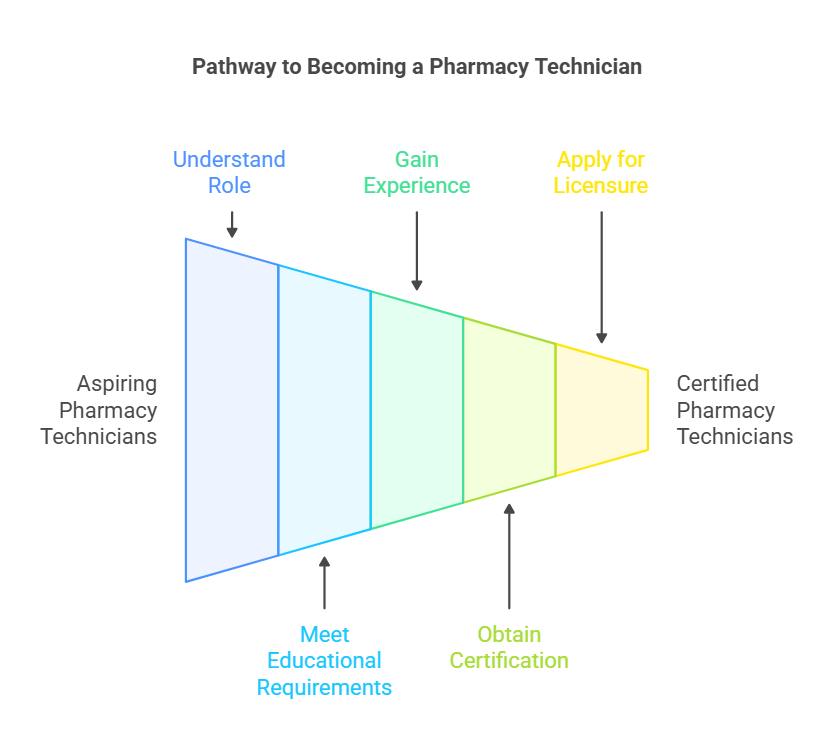Table of Contents
Togglehow to become a pharm tech
how to become a pharm tech Pharmacy technicians play a vital role in the healthcare industry by assisting pharmacists in preparing and dispensing medications, managing pharmacy operations, and ensuring patient safety. Becoming a pharmacy technician can be a fulfilling career choice with plenty of opportunities for growth. In this guide, we will outline the necessary steps, qualifications, and tips on how to become a pharmacy technician.

Step 1: Understand the Role of a Pharmacy Technician
Before embarking on the journey to become a pharmacy technician, it’s essential to have a clear understanding of the role. Pharmacy technicians assist pharmacists in filling prescriptions, organizing medication inventory, verifying patient information, and providing customer service. They also work in various settings, such as retail pharmacies, hospitals, clinics, and long-term care facilities.
Some of the essential responsibilities include:
- Dispensing medications accurately
- Labeling and packaging prescriptions
- Managing inventory
- Communicating with healthcare providers and patients
- Ensuring compliance with regulations
Understanding the job’s duties and challenges will help you decide if it’s the right career path for you.
Step 2: Meet Educational Requirements
In the United States, a high school diploma or GED is typically the minimum education required to become a pharmacy technician. However, some employers may prefer candidates with postsecondary education. Many pharmacy technicians pursue formal training through certificate or associate degree programs offered by community colleges, vocational schools, or online institutions.
A pharmacy technician program usually includes coursework in areas such as:
- Pharmacology
- Drug classifications
- Prescription processing
- Medical terminology
- Pharmacy law and ethics
- Drug dosage calculations
The training period generally lasts anywhere from six months to two years, depending on the program. Some programs also include internships or externships that provide hands-on experience in a real pharmacy setting.
Step 3: Obtain Certification
While certification is not always required, obtaining certification can significantly enhance your career prospects. The most recognized certification for pharmacy technicians in the U.S. is the Pharmacy Technician Certification Board (PTCB) certification. To earn this certification, you must pass the Pharmacy Technician Certification Exam (PTCE), which tests your knowledge of pharmacy practices, medication safety, and ethics.
Alternatively, some states offer their own certification programs, and the National Healthcareer Association (NHA) offers certification through the Exam for the Certification of Pharmacy Technicians (ExCPT).
To become certified, you must meet certain eligibility criteria, such as completing an accredited pharmacy technician program and gaining experience working in a pharmacy. Once certified, you will need to maintain your certification through continuing education and periodic recertification exams.
Step 4: Gain Work Experience
While formal education and certification are important, hands-on experience is equally vital in becoming a successful pharmacy technician. Many pharmacy technician programs include externships that allow you to work directly with patients and pharmacists, giving you the opportunity to apply your knowledge in real-world settings.
After completing your education, you can begin working in various environments such as retail pharmacies, hospitals, or nursing homes. Gaining work experience allows you to develop skills in medication management, patient interaction, and pharmacy operations.
Step 5: Stay Updated with Continuing Education
The field of pharmacy is constantly evolving, with new medications, technologies, and regulations emerging regularly. Pharmacy technicians are required to stay updated on these changes to provide the best care to patients. Continuing education (CE) is essential to keep your skills sharp and your knowledge current.
Many professional organizations, including the PTCB and NHA, offer CE programs that allow pharmacy technicians to earn credits toward recertification. These programs can include online courses, workshops, and seminars.
Step 6: Consider Career Advancement
After gaining experience, pharmacy technicians may choose to advance their careers. There are several paths for growth, such as:
- Specializing in areas like oncology or sterile compounding
- Taking on supervisory or managerial roles in a pharmacy
- Pursuing further education to become a pharmacist
Pharmacy technicians can also explore opportunities in pharmaceutical sales, regulatory agencies, or healthcare administration. With the right combination of experience, education, and certification, you can build a long and rewarding career in the pharmacy field.
Conclusion
Becoming a pharmacy technician requires dedication to education, certification, and hands-on experience. By following the steps outlined in this guide, you can set yourself on the path to a successful career in the healthcare industry. Whether you’re starting your journey or looking for opportunities to advance, pharmacy technicians play an integral role in improving patient care and supporting pharmacists.
FAQs
- What qualifications do I need to become a pharmacy technician? You need at least a high school diploma or GED. Completing a pharmacy technician training program and obtaining certification is also highly recommended.
- Do I need to be certified to work as a pharmacy technician? Certification is not always required, but it enhances your job prospects. You can earn certification through organizations like the Pharmacy Technician Certification Board (PTCB).
- How long does it take to become a pharmacy technician? It typically takes six months to two years to complete a formal training program, depending on whether you pursue a certificate or an associate degree.
- Can pharmacy technicians work in hospitals or clinics? Yes, pharmacy technicians can work in various settings, including hospitals, clinics, retail pharmacies, and long-term care facilities.
- What is the salary of a pharmacy technician? The salary of a pharmacy technician varies based on location, experience, and education, but the median annual wage for pharmacy technicians in the U.S. is around $36,000.
Meta Description
Looking to become a pharmacy technician? This guide provides steps on education, certification, and career tips to help you succeed in this rewarding healthcare profession.

